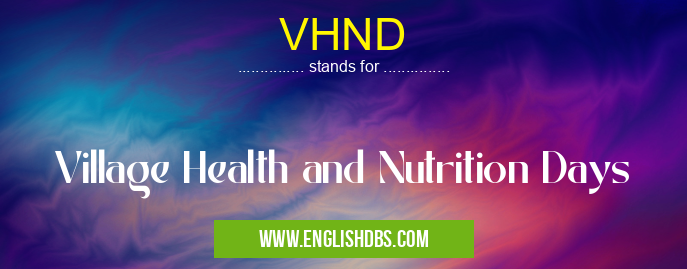What does VHND mean in HEALTHCARE
Village Health and Nutrition Days, also known as VHND, are a strategy to provide primary health care services to rural communities in India. This system consists of health camps that provide free healthcare services to villages every month, focusing on women and children. The VHND approach recognizes the importance of utilizing existing resources and facilities within a community in order to improve access to healthcare.

VHND meaning in Healthcare in Medical
VHND mostly used in an acronym Healthcare in Category Medical that means Village Health and Nutrition Days
Shorthand: VHND,
Full Form: Village Health and Nutrition Days
For more information of "Village Health and Nutrition Days", see the section below.
» Medical » Healthcare
Essential Questions and Answers on Village Health and Nutrition Days in "MEDICAL»HEALTHCARE"
What is VHND?
VHND stands for Village Health and Nutrition Days. It is a strategy used to provide primary healthcare services in rural areas of India.
How often do VHNDs occur?
VHNDs occur on an monthly basis throughout the year.
What types of services are provided through VHNDs?
Through VHNDs, villagers can receive free healthcare services including diagnosis, treatment, health education sessions, and referrals.
Who can access the services offered during VHNDs?
All villagers are welcome to attend VHNDs regardless of age or gender to access healthcare services. Priority is given to women and children.
Are any additional resources provided besides healthcare services?
Yes, these days also provide nutrition education and counseling sessions for pregnant women and lactating mothers regarding infant feeding practices.
Final Words:
Village Health and Nutrition Days (VHNDS) offer an effective way for rural communities in India to access primary healthcare services at no cost on a monthly basis throughout the year. Women and children have priority when accessing these free healthcare clinics but all villagers are welcome regardless of age or gender. In addition to providing diagnosis and treatment services, these days also focus on providing educational resources about nutrition for pregnant women and lactating mothers as well as their infants' feeding practices.
